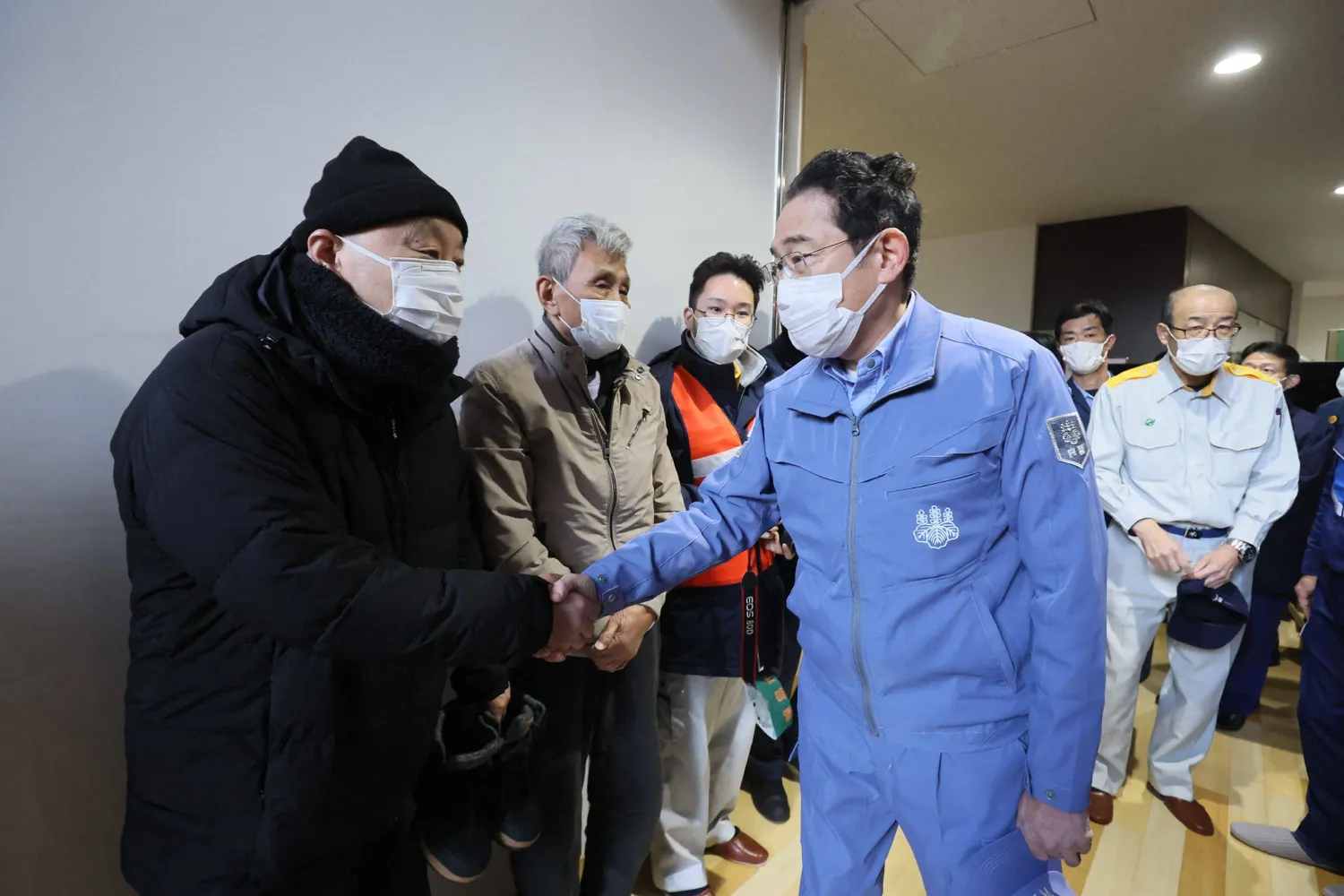Japan's Prime Minister Fumio Kishida visited Sunday the country's north-central region of Noto for the first time since the deadly Jan. 1 earthquakes to alleviate growing concern about slow relief work and the spread of diseases in evacuation centers.
The magnitude 7.6 earthquake left 220 dead and 26 others still missing while injuring hundreds. More than 20,000 people, many of whom had their homes damaged or destroyed, are taking refuge at about 400 school gymnasiums, community centers and other makeshift facilities, according to the Fire and Disaster Management Agency report.
Road damage has hampered rescue efforts, and though relief supplies have reached most regions affected by the quake, hundreds of people in isolated areas are getting little support. Additionally, in the hard-hit towns of Noto, Wajima and Suzu, elderly residents account for half their population, and many are facing growing risks of deteriorating health, officials and experts say.
Kishida, in his disaster-response uniform, visited a junior high school that has turned into an evacuation center in Wajima where officials showed him the evacuees' severe living conditions. They also spoke about the potential risk of spreading infectious diseases, such as influenza, COVID-19 and stomach flu due to the lack of running water.
The prime minister said he takes the evacuee's conditions seriously and promised support. “We will do everything we can so that you can have hope for the future," he said.
To prevent possible health problems and risk of death at evacuation centers, local and central government officials said they would provide the evacuees free accommodation at hotels and apartments — further away from their neighborhoods — until temporary housing was ready. But many of the locals have refused to move out, worried about their destroyed homes, belongings and communities.
Ishikawa Gov. Hiroshi Hase urged on Friday the residents to temporarily relocate to the recommended facilities to rest better and “protect your lives.”
Mototaka Inaba, a medical doctor who heads an international relief organization Peace Winds Japan, told an NHK talk show on Sunday that a secondary evacuation of elderly residents was critical from a medical perspective but should be done in a way that didn't isolate them.
According to The Associated Press, Chief Cabinet Secretary Yoshimasa Hayashi also stressed in a pre-recorded interview with NHK the importance of relocating the residents taking into consideration their sense of community, jobs and education.
Many have criticized Kishida's government over what they called a slow disaster response.
The cabinet has approved 4.7 billion yen (about $32 million) for relief efforts and is backing the call for a secondary evacuation, including to facilities in the capital region.
Japan PM Visits Quake-hit Region as Concerns Rise about Diseases

Japan's Prime Minister Fumio Kishida (R) speaks with evacuees in an evacuation center in Wajima city, of Ishikawa Prefecture on January 14, 2024, after a major 7.5 magnitude earthquake struck the Noto region in Ishikawa prefecture on New Year's Day. (Photo by JIJI PRESS / AFP)

Japan PM Visits Quake-hit Region as Concerns Rise about Diseases

Japan's Prime Minister Fumio Kishida (R) speaks with evacuees in an evacuation center in Wajima city, of Ishikawa Prefecture on January 14, 2024, after a major 7.5 magnitude earthquake struck the Noto region in Ishikawa prefecture on New Year's Day. (Photo by JIJI PRESS / AFP)
لم تشترك بعد
انشئ حساباً خاصاً بك لتحصل على أخبار مخصصة لك ولتتمتع بخاصية حفظ المقالات وتتلقى نشراتنا البريدية المتنوعة







